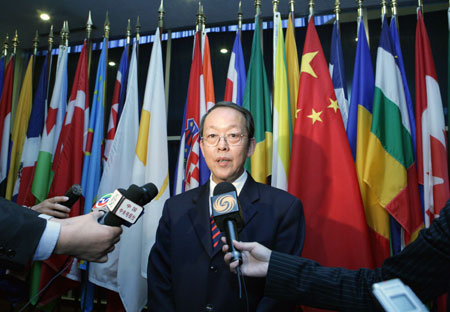UNGA rejects Taiwan's UN bid
Updated: 2007-09-20 02:21
|
|
UNITED NATIONS - The General Committee of the 62nd session of the UN General Assembly decided on Wednesday not to include the so-called issue of "Taiwan's participation in the United Nations," raised by the Solomon Islands and a very few other countries, into the agenda of the General Assembly.
Since 1993, the General Assembly has for the 15th consecutive time thwarted Taiwan's attempt to join the world body composed of sovereign states.
Addressing the session, Wang Guangya, Chinese permanent representative to the United Nations, said that there is but one China in the world and Taiwan has been an inalienable part of China since ancient times, a fact that has been recognized by the United Nations and the vast majority of countries around the world.
"The Taiwan question is purely an internal affair of China," Wang said. "It should be resolved by the Chinese people on both sides of the Taiwan Straits."
"Although China is not yet reunited, the fact that both Taiwan and the mainland belong to one and the same China has never been changed," Wang stressed.
UN General Assembly Resolution 2758, adopted in 1971, explicitly stipulates that the representatives of the government of the People's Republic of China are the only legitimate representatives of China in the United Nations, Wang said.
"This resolution has very clear political and legal meanings," the ambassador said. "It is based on the important prerequisite that China is an integrated country and Taiwan is a part of China. "
"The United Nations is an intergovernmental organization composed only of sovereign states. As a region of China, Taiwan is not entitled to apply for UN membership in whatever name," Wang stressed.
"No one cares more about the prospect and interests of the 23 million Taiwan compatriots than the Chinese government. In consistent adherence to the fundamental principle of 'peaceful reunification and one country, two systems,' the Chinese government has made every effort and worked with utmost sincerity to deliver benefits to the compatriots on both sides of the Taiwan Straits and strive for the prospect of peaceful reunification," the ambassador said.
"We sincerely hope that the two sides of the Taiwan Straits would render mutual respect, cooperate for mutual benefit, strengthen people-to-people contacts, enhance economic exchanges and trade, and expand cooperation in all fields to work together to build a beautiful homeland for people across the Straits," Wang said.
He condemned the Chen Shui-bian authorities for deliberately provoking cross-Straits confrontation and intensifying their efforts to seek the so-called "constitutional reengineering," " referendum on Taiwan's membership of the United Nations" and pushing for "de jure Taiwan independence."
"The 'Taiwan independence' forces and their separatist activities remain the biggest obstacle to cross-Straits relations and constitute the biggest threat to peace and stability across the Taiwan Straits and in the Asia-Pacific Region," Wang said.
He stressed that the 23 million Taiwan compatriots are part of the 1.3 billion Chinese people.
"Any decision on issues concerning China's sovereignty and territorial integrity must be jointly made by the 1.3 billion Chinese people," Wang stressed. "It serves the fundamental and long-term interests of the compatriots on both sides of the Taiwan Straits to oppose and curb the 'Taiwan independence' forces and their separatist activities and maintain peace and stability across the Taiwan Straits."
|
|
|
||
|
||
|
|
|
|
